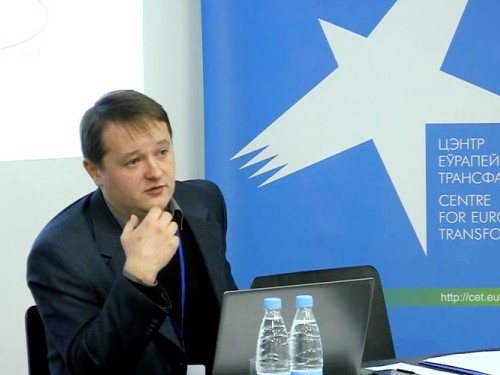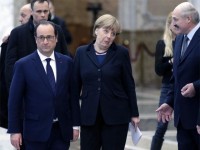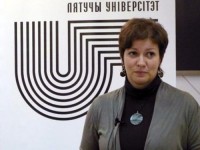We present a collection of articles “Civil society in Belarus 2015-2021: from stable development to new challenges”.
Speech by Andrei Yahorau during the Eastern Partnership Informal Ministerial Dialogue in Minsk

Andrei Yahorau, co-chairs of the Steering Committee of the EaP CSF, country facilitator for Belarus of the EaP CSF, and the Director of the Center for European Transformation, spoke at 5th EaP Informal Ministerial Dialogue in Minsk. We present the text of his speech.
Presentation
by the Eastern Partnership Civil Society Forum
to the EaP Informal Partnership Dialogue
Minsk, 29 June 2015
Dear Commissioner, dear Ministers, thank you very much for this opportunity to speak here on behalf of the Eastern Partnership Civil Society Forum.
I am not going to touch the problems of Eastern Partnership which you definitely aware of, but will concentrate more on the possible sources of its development in these turbulent times. In the meaning of “partnership” we explicitly imply at least two sides responsible for it. And in this particular case of Eastern Partnership there are: EU who initiated it and proposed a framework for it and partner countries who accepted the proposal.
Currently, EU puts the general European Neighborhood Policy framework under revision and this influences EaP as well. The concept of “differentiation” became a key one in the revision process. Differentiation is discussed as an approach that put format of EU’s relations with partners into the dependence from partner countries’ ambitions. In other words partner countries could choose the level of engagement, preferable formats and priority spheres of cooperation with EU. On the one hand, doing so EU tends to put more responsibility on partners and to make them more accountable for the future results of cooperation. On the other hand, EU partly reduces its own policy ambitions to the limits of partners’ aspirations.
If to apply these meaning of “differentiation”, then the European Neighborhood Policy, in some sense, will look like a supermarket, where customers (partners) may form their own basket of goods by choosing from the options presented on the shelves. If to explore this ENP-supermarket metaphor further we can ask about: What does it sell? Who is eligible to enter? What are the prices for the different goods?
In our vision the main mission of ENP and Eastern Partnership is to facilitate European transformations in neighboring countries. We believe that only transformations to the market economy, rule of law and democracy can form a firm basis for the prosperity and long-term stability in EaP countries. So ENP sells tools and instruments for transformations. Then it will be logical that ENP provides these tools for the actors who can use them. And these are not only partner countries governments but also other stakeholders like civil societies, private business, trade unions, local authorities. Such kind of “differentiation” at the entrance and multi-stakeholders approach extends our understanding of “partner’s aspirations” to the aspirations of the partner countries’ societies. Let’s also look at the differentiation of price for different “transformation packages”. The level of EU conditionality could be applied differently according to the different choices. An Association Agreements as high level option could include high level of conditionality but for the limited options of sectoral cooperation these level could be lower. In such mutually beneficial spheres like mobility, visa liberalization, students and researches exchange, SMEs, business and digital economy, interconnectivity the lower level of conditionality could be applied. Good governance, institution building, home affairs and justice reform requires more strict conditions.
Civil society is a natural ally of partner’s governments and EU in the reforms process. It could bring people’s energy, fresh ideas and considerable contribution to the reforms implementation. But till the moment it is not fully legitimate actor and equal participant of the EaP development. Civil Society Forum deeply regrets of the practice of limitations of freedoms of association and repressions against civil society activists in Azerbaijan, Armenia and Belarus. We strongly condemn the resent act of aggression against peaceful protesters in Armenia. The situation of voluntary detention and politically motivated imprisonment of civil activists is unacceptable; it remains one of the main obstacles for engagement of these countries with the EU and does not help to build trustful relations between governments and civil society.
Civil Society Forum and its National Platforms are looking forward to cooperative and inclusive relations with the national governments and EU during Association Agreements implementation and other agreed formats of cooperation. We urge decision-makers to strengthen dialogue with EaP CSF National Platforms in all areas, including at the development stages of policy and programme documents, ensure access to all EU-EaP documents and provide financial support. Furthermore, rooted in various communities, civil society should be at the core of building local communication strategies on EU values and benefits of EU approximation reforms.
Thank you very much for your attention.


Others
-
A usual circle. No sanctions, no changes
After the abolition of the sanctions, the EU and Minsk will further expect from each other for the steps that no one is going to take. The situation in the country will not change; only the third force can affect it. If the Belarusan civil society doesn’t become this third force, then Russia will become it.
-
Letter from Minsk
Strategic Europe continues the second phase of its Capitals Series exploring how EU foreign policy is viewed by six countries in Europe’s Eastern neighborhood. Carnegie Europe asked contributors from each capital to give a candid assessment of the EU’s policies toward their country, with a ranking on a scale from “miserable” to “excellent.” The spotlight is on Belarus.
-
The Year of Belarusan thinking in the Flying University
We publish the speech of Tatiana Vadalazhskaya, a coordinator of the Flying University, during the first session of the university seminar in the 2015-2016 academic year.
-
Academic non-freedoms
In order to join the Bologna process in practice, Belarus needs institutional structural changes.








Comments
Andrei Yahorau — Al Jazeera: “Lukashenko is irresponsible”
He said Belarus would likely face economic tightening not only as a result of the coronavirus pandemic but also a Russian trade oil crisis that worsened this past winter.